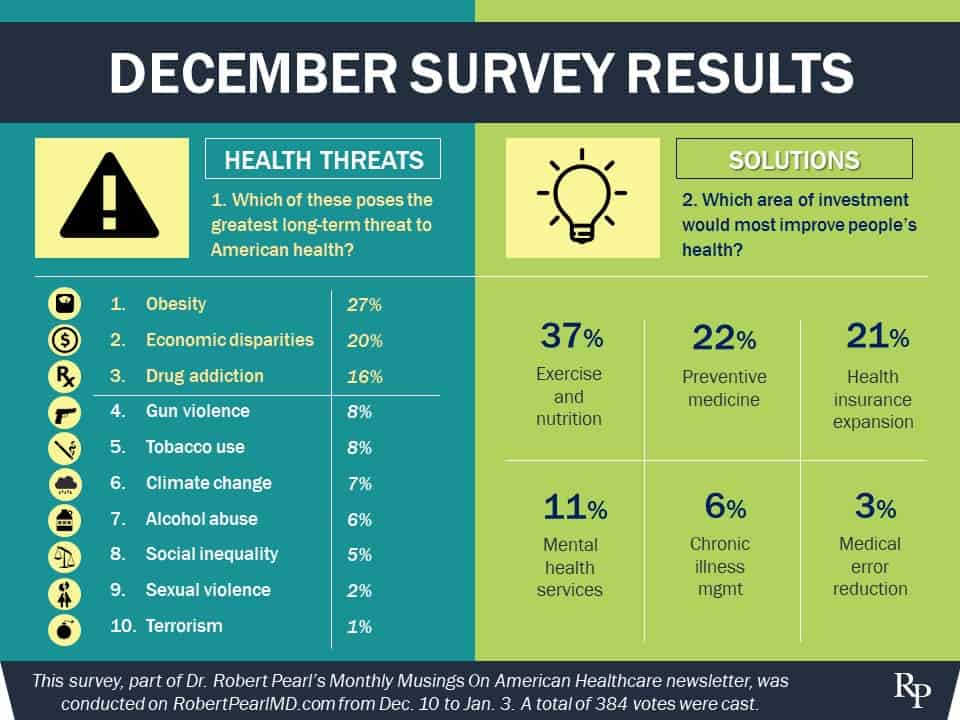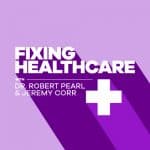According to the CDC, life expectancy in the United States declined for the third straight year. As impossible as it may seem, the United States now ranks 29th globally in average lifespan despite spending $3.5 trillion each year on healthcare. My recent LinkedIn post on this troubling turn of events generated a huge response from people inside and outside the healthcare industry.
Perhaps years of reporting on the healthcare system’s failures have numbed me to what should be shocking information. But, frankly, I’m not surprised by these numbers. And until our nation addresses the system’s shortcomings, I am certain little will improve. As the saying goes, “The definition of insanity is doing the same thing over and over again, but expecting different results.”
For the December reader survey, I asked for your opinion on what poses the greatest threat to our nation’s future health and where we need to invest to expedite solutions. Here’s what you said:

My take: We certainly could improve the health of our nation by addressing the top three “long term threats” readers selected. New studies suggest obesity leads to more doctor visits than smoking and constitutes a bigger disease threat. One-third of adults will develop Type 2 diabetes by 2030, ushering in a higher risk of heart disease, kidney failure and peripheral vascular insufficiency. Meanwhile, rising economic disparities and drug addiction are taking a huge toll on American lives, the latter of which is widely sighted for the ongoing dips in U.S. life expectancy.
I was interested to see gun violence and climate change, two major societal issues, each receive less than 10% of the vote. A study in NEJM recently found shootings to be the second leading cause of death for people under 18 (after motor vehicle accidents). Meanwhile, weather and climate-related disasters resulted in more than $350 billion in damages in the United States over the past two years. And yet, despite mounting evidence that points to the devastating effects of climate change, many continue to question its long-term impact on national and global health.
In question two, readers favored proactive solutions, suggesting that diet, exercise and preventive medicine would help doctors and patients get ahead of major illness. In some ways, these three areas of investment address the biggest problems identified in question one. Taken together, these solutions could reduce the incidence of and complications from diabetes, cardiovascular disease and cancer. Similarly, healthcare coverage is a proactive first step toward mitigating the health consequences of drug addiction and economic inequality.
Results from the November anniversary survey
For the anniversary issue of “Monthly Musings on American Healthcare,” I asked for your feedback and ideas to improve the newsletter. I appreciate the excellent responses I received:


For the New Year, I resolve to incorporate more of what you like and less of what you don’t. As always, please don’t hesitate to reply to this newsletter if you have a story idea or topic for an upcoming issue of Monthly Musings.
A REQUEST FROM ME TO YOU
Having enjoyed my time as a surgeon and healthcare CEO in Kaiser Permanente, my current focus is using what I’ve learned to improve the health of our entire nation. I’m confident it can happen, not by introducing some pricey medication or rolling out a new killer app, but by restructuring healthcare delivery and creating solutions for the patient in all of us.
I suspect that much of the problem in healthcare today is that we as patients blindly accept the system, not knowing what’s possible. As I wrote in Mistreated, “When we start with what we want, need, and deserve from healthcare, the solutions become clearer. What most Americans want is reasonable and possible.”
To that end, I have two requests:
- Would you please forward a copy of this month’s Musings to five friends or family members who live in a different part of the country than you do?
- Would you please encourage them to sign up (for free) for this newsletter?
The two most recent elections taught me just how much our views depend on where we live and who we talk/listen to on a daily basis. This shouldn’t have a trickle-down effect on our health but, increasingly, it does. We need to change this. Regardless of our social or political affiliations, we all want and deserve better healthcare.
This will happen once we fundamentally restructure how we medical care is provided, reimbursed, technologically supported and led. These system-wide improvements don’t happen without a critical mass. That’s why I’m asking for your help in spreading solutions far and wide.
* * *
Dr. Robert Pearl is the former CEO of The Permanente Medical Group, the nation’s largest physician group. He’s the bestselling author of “Mistreated: Why We Think We’re Getting Good Health Care–And Why We’re Usually Wrong” and a Stanford University professor. Follow him on Twitter @RobertPearlMD.







Dr. Pearl – Chronic illness and the conventional medicine approach of a one-size fits all treatment with pharmaceuticals is bankrupting medicine. Raising human consciousness is the single most important approach to improving health care. Life style changes – better nutrition, exercise, stress management, sleep are a first step. Your broad overview and deep knowledge of health care delivery has been very beneficial. Kaiser Permanente is a model system. However, chronic illness is not the same as acute illness at which conventional medicine excels. A functional medicine approach may be what is needed to begin to shift the way in which we approach chronic disease.
Thanks for your thoughtful monthly musings. They get my mind out of my day-to-day practice in Pediatrics and thinking broadly about healthcare and healing. I chose obesity as the biggest problem, but wanted to add a caveat. Obesity is the downstream effect of our current health and wellness crisis. And the health and wellness crisis is multi-factorial, but we all find common ground knowing that the solution is to help our patients eat healthier, drink healthier and exercise more. The forces driving our patients towards an unhealthy lifestyle are broad, but we can and should do more. Image our nation SLOWLY siphoning some of the current $200 – $500 billion/year that we spend on treating the consequences of obesity (T2DM, heart disease, stroke, etc) toward prevention. Image our nation investing that money in the future health of our children….